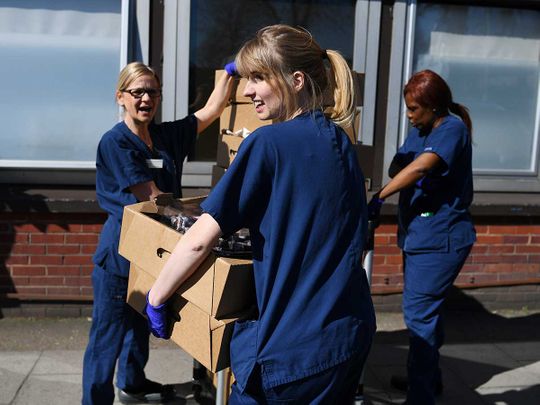
With so many people sick and dying and US unemployment at a level not reached since the Great Depression — and people in poor countries even worse off — many want to address those needs.
This column is an answer to those queries. I’ve picked a few organisations that are responding brilliantly to the coronavirus and have sound plans to expand their work if they can raise the cash.
Trauma in the early years shapes the developing brain, leads kids to lag behind in school and affects physical and mental health even decades later
I’m working with Focusing Philanthropy, a well-regarded non-profit that supports intelligent giving and will cover credit card fees for your gift. This means that 100 cents of each dollar will reach the recipient organisation if you donate through the website we’ve created for this initiative: KristofC19ImpactInitiative.org.
So at this time of exploding need, consider these causes:
Food insecurity is soaring, magnified because children often can no longer get free school lunches and because food pantries are short of supplies.
Last month, a vehicle line to a food bank near Pittsburgh, US stretched for miles, and a survey of New York state residents found 41% worried about being able to afford food.
Catalyst Kitchens provides nutritious meals to hungry families in 32 states. Since 2011, the group’s network of members has distributed some 72 million meals.
A beautiful element of the Catalyst program is who cooks the food: The network trains homeless people, those recovering from addiction and those recently released from incarceration to prepare the meals so that they can eventually find jobs in restaurants or institutions.
Since the non-profit FareStart established it, Catalyst has placed 14,000 such workers into food service jobs.
Addressing the virus
Last month the IRC announced an initiative to address the virus worldwide, including in migrant camps on the Mexican side of the US border.
Many people there are asylum seekers from Central America who have been pushed into Mexico, perhaps illegally, by the Trump administration and are easy prey for gangs and viruses alike.
The IRC trains volunteers who work with community leaders to try to limit the pandemic in this vulnerable population.
As the son of a refugee, I feel particular admiration for an aid group that tries to save the lives of people who have already endured so much.
Even in the best of times, the US has one of the highest rates of child poverty in the developed world, and now many of those children are at home missing both school lunches and an education.
Twelve million children don’t have internet at home, so how are they supposed to engage in remote learning?
Save the Children is best known for helping children in Africa and Asia, but it also works in low-income American communities, and it is now stepping into the breach. In these areas in the United States, Save the Children is providing both meals and books, all for less than $15,000 per school district.
Much of the talk about the effects of COVID-19 has been about the unemployed, and that’s enormously important. But my top concern is children.
Trauma in the early years shapes the developing brain, leads kids to lag behind in school and affects physical and mental health even decades later.
We tell people in a pandemic to protect themselves by washing their hands — yet UNICEF calculates that 3 billion people can’t wash their hands at home because of a lack of water and soap.
One recent study found that at some places in Africa, Asia and South America, a majority of people had been unable to wash their hands in the previous month.
That’s where Water for People comes in. It brings water, toilets and hygiene education to villagers in Africa, Asia and Latin America, often by drilling a well at a health center.
Sited there, it can be used by the medical staff as well as by the surrounding community.
In an ideal world, doctors and patients in poor countries would have access to oxygen and ventilators.
In this imperfect world, we can at least get them clean water so they can wash their hands and try to protect themselves from COVID-19.
NYT
Nicholas Kristof is an American journalist, author and a winner of two Pulitzer Prizes.








